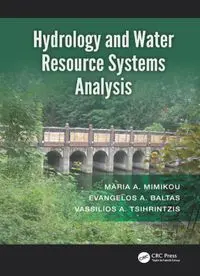
Hydrology and water resource systems analysis PDF
Preview Hydrology and water resource systems analysis
Hydrology and Water Resource Systems Analysis Hydrology and Water Resource Systems Analysis MARIA A. MIMIKOU National Technical University of Athens, Greece EVANGELOS A. BALTAS National Technical University of Athens, Greece VASSILIOS A. TSIHRINTZIS National Technical University of Athens, Greece CRC Press Taylor & Francis Group 6000 Broken Sound Parkway NW, Suite 300 Boca Raton, FL 33487-2742 © 2016 by Taylor & Francis Group, LLC CRC Press is an imprint of Taylor & Francis Group, an Informa business No claim to original U.S. Government works Printed on acid-free paper Version Date: 20151014 International Standard Book Number-13: 978-1-46658130-2 (Hardback) This book contains information obtained from authentic and highly regarded sources. Reasonable efforts have been made to publish reliable data and information, but the author and publisher cannot assume responsibility for the validity of all materials or the consequences of their use. The authors and publishers have attempted to trace the copyright holders of all material reproduced in this publication and apologize to copyright holders if permission to publish in this form has not been obtained. If any copyright material has not been acknowledged please write and let us know so we may rectify in any future reprint. Except as permitted under U.S. Copyright Law, no part of this book may be reprinted, reproduced, transmitted, or utilized in any form by any electronic, mechanical, or other means, now known or hereafter invented, including photocopying, microfilming, and recording, or in any information storage or retrieval system, without written permission from the publishers. For permission to photocopy or use material electronically from this work, please access www.copyright.com (http://www.copyright.com/) or contact the Copyright Clearance Center, Inc. (CCC), 222 Rosewood Drive, Danvers, MA 01923, 978-750-8400. CCC is a not-for-profit organization that provides licenses and registration for a variety of users. For organizations that have been granted a photocopy license by the CCC, a separate system of payment has been arranged. Trademark Notice: Product or corporate names may be trademarks or registered trademarks, and are used only for identification and explanation without intent to infringe. Library of Congress Cataloging-in-Publication Data Names: Mimikou, Maria A., author. | Baltas, Evangelos A., author.| Tsihrintzis, Vassilios A., 1959-author. Title: Hydrology and water resource systems analysis / authors, Maria A Mimikou, Evangelos A Baltas, Vassilios A Tsihrintzis. Description: Boca Raton: Taylor & Francis, 2016. | Includes bibliographical references and index. Identifiers: LCCN 2015039103 | ISBN 9781466581302 (alk. paper) Subjects: LCSH: Water resources development. | Hydrology. | System analysis. Classification: LCC TC405 .M49 2016 | DDC 551.48--dc23 LC record available at http://lccn.loc.gov/2015039103 Visit the Taylor & Francis Web site at http://www.taylorandfrancis.com and the CRC Press Web site at http://www.crcpress.com To my husband Yiannis and my daughter Alexandra for their support Maria Mimikou To my family Evangelos Baltas In memory of my parents Andreas and Evangelia to whom I owe everything. To my wife Alexandra and my two sons Andreas and Konstantinos for their support, encouragement and patience Vassilios A. Tsihrintzis Contents Preface Authors 1 Introduction 1.1 General 1.2 The Science of hydrology 1.3 Historical evolution of hydrology 1.4 Classification of hydrology 1.5 Hydrological cycle 1.6 Hydrological variables and their units of measurement 1.7 River basin 1.8 Scale in hydrology 1.8.1 Spatial scale 1.8.2 Timescale 1.9 Worldwide distribution of water 1.10 Hydrological balance References 2 Precipitation and hydrological losses 2.1 General 2.2 Formation of atmospheric precipitation 2.3 Precipitation types 2.3.1 Rain 2.3.2 Snow 2.3.3 Hail 2.4 Cooling mechanisms and types of precipitation 2.4.1 Cyclonic cooling 2.4.2 Orographic cooling 2.4.3 Conductive cooling 2.5 Measurement of precipitation 2.5.1 Precipitation sensors 2.5.2 Rain gauge recorders 2.5.3 Snowfall measurement 2.5.4 Meteorological radar 2.5.5 Joss–Waldvogel disdrometers 2.5.5.1 Description of the disdrometer RD-80 2.5.5.2 Hydro-meteorological parameters which can be derived by the RD-69 and RD-80 disdrometers 2.5.5.3 Derivation of rain characteristics with the use of a Joss–Waldvogel RD-69 disdrometer 2.5.6 Installation of rain gauges 2.5.7 Space measurements 2.5.7.1 Satellites 2.5.7.2 Installed instruments 2.5.7.3 Advanced precipitation radar 2.5.7.4 Microwave imager 2.5.7.5 Visible and infrared radiation scanner 2.5.7.6 Clouds and the Earth’s radiant energy system 2.5.7.7 Lightning imaging sensor 2.6 Installation of network of point measurement devices 2.7 Test of data homogeneity and analysis of double cumulative curves 2.8 Completion of rainfall measurements: Adaptation to different altitudes 2.8.1 Method of arithmetic mean 2.8.2 Method of normal ratios 2.8.3 Inverse distance method 2.8.4 Correlation and regression 2.8.5 Correction of rainfall with altitude 2.9 Surface integration of areal rainfall from point measurements 2.9.1 Averaging method 2.9.2 Thiessen method 2.9.3 Isohyetal curve method 2.9.4 Optimum interpolation method (Kriging) 2.9.5 Time distributions of rainfall 2.9.5.1 Limited-scale phenomena 2.9.5.2 Medium-scale phenomena 2.9.5.3 Synoptic-scale phenomena 2.10 Hydrological losses 2.10.1 General 2.11 Evaporation 2.11.1 Water balance methods 2.11.1.1 Thornthwaite’s water balance method 2.11.2 Energy balance methods 2.11.3 Mass transfer methods 2.11.4 Combination methods: Penman method 2.12 Evapotranspiration 2.12.1 Water balance methods 2.12.2 Methods for the determination of potential evapotranspiration from climatic data 2.12.2.1 Penman–Monteith method 2.12.2.2 Thornthwaite’s method 2.12.2.3 Blaney–Criddle method 2.12.2.4 Jensen–Haise method 2.12.2.5 Makkink’s method 2.12.2.6 Hargreaves method 2.12.2.7 Priestley–Taylor method 2.12.3 Methods for the determination of actual evapotranspiration 2.12.3.1 Turc method 2.12.3.2 Coutagne method 2.13 Infiltration rate estimation 2.13.1 Infiltration 2.13.2 Hotton’s model (1930) 2.13.3 Green–Ampt model (1911) 2.13.4 Huggins–Monke model (1966) 2.13.5 Holtan model (1961) 2.13.6 Kostiakov model (1932) 2.13.7 Philip model (1954) 2.13.8 Soil Conservation Service method References 3 Runoff 3.1 General 3.2 River basin 3.3 Hydrographs 3.3.1 Characteristics of the hydrograph 3.3.1.1 φ index
